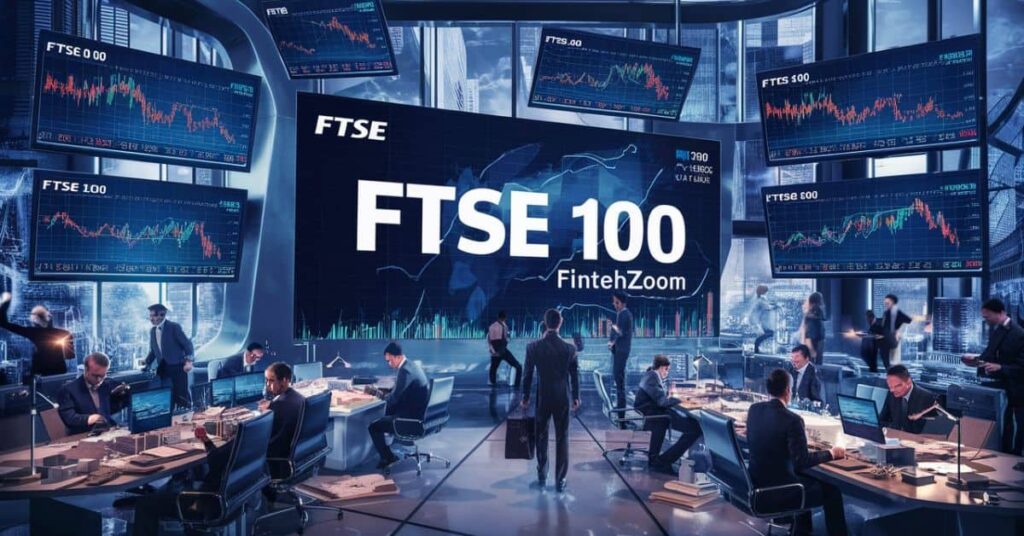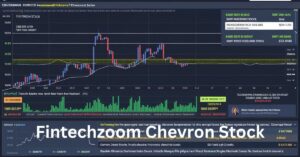FTSE 100 FintechZoom: Understanding the UK’s Leading Stock Market Index

The FTSE 100 is a crucial financial index that represents the largest 100 companies listed on the London Stock Exchange (LSE). It serves as a key indicator of the UK stock market’s overall performance, much like the Dow Jones Industrial Average in the United States. In recent years, interest in the FTSE 100 has expanded globally, especially in the USA, due to its potential for investment opportunities and its influence on global markets. The term “FTSE 100 FintechZoom” has gained attention as individuals seek detailed, humanized, and easy-to-read insights into this index through platforms like FintechZoom. This article aims to provide a comprehensive analysis of the FTSE 100, focusing on its significance, how it’s influenced by global economic trends, and why platforms like FintechZoom are pivotal for staying informed about it.
What is the FTSE 100?
The FTSE 100, often simply called the “Footsie,” stands for the Financial Times Stock Exchange 100 Index. It was created in 1984 and is managed by the FTSE Group, a subsidiary of the London Stock Exchange. The index includes the 100 largest companies by market capitalization listed on the LSE, covering a wide range of sectors such as banking, energy, mining, and consumer goods. These companies represent about 81% of the LSE’s market capitalization, making the FTSE 100 a reliable gauge of the UK stock market’s health.
How the FTSE 100 Works
The FTSE 100 is a market capitalization-weighted index, meaning that companies with larger market caps have a more significant impact on the index’s value. Market capitalization is calculated by multiplying the current share price by the total number of outstanding shares. As a result, companies like Shell, HSBC, and Unilever, which have substantial market caps, heavily influence the FTSE 100.
The index is recalculated in real-time during trading hours, providing a live snapshot of the market’s performance. Quarterly reviews are conducted to ensure that the 100 largest companies remain in the index, with companies being added or removed based on their market capitalization at the time of review.
Importance of the FTSE 100 in Global Markets
The FTSE 100 is not just important within the UK; it holds significant sway in global markets as well. Many of the companies in the index are multinational corporations with operations spanning the globe. For example, BP and GlaxoSmithKline generate a significant portion of their revenues outside the UK. This international exposure means that the FTSE 100’s performance can reflect global economic trends, making it a valuable index for investors worldwide.
Moreover, the FTSE 100 often serves as a barometer for the overall economic health of the UK. A rising FTSE 100 typically indicates positive investor sentiment and a strong economy, while a falling index can signal economic challenges.
Why FintechZoom is Essential for FTSE 100 Insights
In the age of digital information, having access to real-time, accurate, and detailed financial data is crucial. This is where FintechZoom comes into play. FintechZoom is a leading financial news and analysis platform that offers up-to-date information on various financial markets, including the FTSE 100. The platform provides in-depth articles, market analysis, and real-time updates, making it an invaluable resource for both novice and experienced investors.
One of the main advantages of using FintechZoom is its user-friendly interface, which is designed to cater to a broad audience. The platform breaks down complex financial concepts into easily digestible content, making it accessible to individuals with varying levels of financial literacy. This is particularly important for users in the USA who may not be as familiar with the UK markets.
The Impact of Global Economic Trends on the FTSE 100
The FTSE 100 is heavily influenced by global economic trends. Events such as changes in interest rates, geopolitical tensions, and fluctuations in commodity prices can all have a significant impact on the index’s performance.
For instance, the COVID-19 pandemic had a profound effect on the FTSE 100, causing it to plummet in March 2020 as global markets reacted to the uncertainty. However, the index gradually recovered as governments implemented stimulus measures and vaccination programs were rolled out. This recovery highlighted the resilience of the companies within the FTSE 100, many of which are leaders in sectors such as pharmaceuticals, energy, and technology.
Sectoral Breakdown of the FTSE 100
Understanding the sectoral composition of the FTSE 100 is essential for grasping the index’s dynamics. The index is heavily weighted towards certain sectors, which can influence its overall performance.
- Financial Services: Banks and financial institutions make up a significant portion of the FTSE 100. Companies like HSBC, Lloyds Banking Group, and Barclays are major players in this sector. The health of the financial services sector is closely tied to the broader economy, making it a critical component of the FTSE 100.
- Energy: The energy sector is another heavyweight in the FTSE 100, with companies like BP and Royal Dutch Shell leading the charge. The performance of energy stocks is often linked to global oil prices, making this sector highly sensitive to geopolitical events and supply-demand dynamics.
- Consumer Goods: The consumer goods sector includes companies like Unilever and British American Tobacco, which produce everyday items that are in constant demand. This sector tends to be more stable, providing a cushion during economic downturns.
- Mining: The UK has a rich history in mining, and this is reflected in the FTSE 100 with companies like Rio Tinto and BHP Group. The mining sector is closely tied to global commodity prices, particularly metals like copper, iron ore, and gold.
- Healthcare: The healthcare sector, represented by companies like GlaxoSmithKline and AstraZeneca, plays a crucial role in the FTSE 100. This sector has gained even more prominence due to the COVID-19 pandemic, with vaccine development and pharmaceutical innovation driving growth.
FTSE 100 vs. Other Global Indices
Comparing the FTSE 100 to other global indices can provide valuable insights into its unique characteristics. While the FTSE 100 is similar to the S&P 500 or the Dow Jones Industrial Average in the USA, there are key differences.
- Geographical Focus: The FTSE 100 is more geographically diversified, with many of its constituent companies generating a significant portion of their revenue from outside the UK. In contrast, the S&P 500 and Dow Jones are more focused on the US market.
- Sectoral Composition: The FTSE 100 has a higher concentration of energy, mining, and financial services companies compared to the S&P 500, which is more diversified across sectors such as technology, healthcare, and consumer discretionary.
- Currency Impact: The performance of the FTSE 100 can be influenced by fluctuations in the British pound. A weaker pound can boost the earnings of FTSE 100 companies with significant overseas revenue, making the index more sensitive to currency movements compared to US indices.
How to Invest in the FTSE 100
Investing in the FTSE 100 can be a strategic move for those looking to diversify their portfolio with exposure to the UK market. There are several ways to invest in the FTSE 100:
- Exchange-Traded Funds (ETFs): ETFs are one of the most popular ways to invest in the FTSE 100. These funds track the performance of the index and can be traded on stock exchanges just like individual stocks. Some popular FTSE 100 ETFs include the iShares Core FTSE 100 UCITS ETF and the Vanguard FTSE 100 ETF.
- Individual Stocks: Investors can also choose to invest in individual companies within the FTSE 100. This approach requires more research and management, but it allows for targeted exposure to specific sectors or companies.
- Mutual Funds: Some mutual funds are designed to track the FTSE 100, providing investors with a more managed approach. These funds are managed by professionals who make decisions about the fund’s composition based on market conditions.
- Contracts for Difference (CFDs): CFDs allow investors to speculate on the price movements of the FTSE 100 without actually owning the underlying assets. This is a more advanced investment strategy that carries higher risk.
Risks and Opportunities in FTSE 100 Investing
Like any investment, putting money into the FTSE 100 comes with risks and opportunities. Understanding these can help investors make informed decisions.
- Opportunities: The FTSE 100 offers exposure to some of the world’s largest and most established companies. Many of these companies are leaders in their respective industries, providing a level of stability and growth potential. Additionally, the global nature of the FTSE 100 means that it can benefit from economic growth in various regions.
- Risks: The FTSE 100 is not immune to economic downturns, and its performance can be affected by factors such as Brexit, changes in UK government policy, and global economic slowdowns. Additionally, the index’s heavy weighting towards sectors like energy and financial services means it can be more volatile than other indices.
How FintechZoom Enhances FTSE 100 Analysis
FintechZoom stands out as a valuable tool for anyone interested in the FTSE 100. The platform’s comprehensive coverage of financial news, combined with its user-friendly interface, makes it easier for investors to stay informed about market trends.
- Real-Time Updates: FintechZoom provides real-time updates on the FTSE 100, ensuring that investors have access to the latest information. This is crucial in today’s fast-paced markets, where conditions can change rapidly.
- In-Depth Analysis: The platform offers detailed analysis of the FTSE 100, including insights into individual companies, sectoral performance, and the impact of global economic trends. This analysis goes beyond surface-level information, providing investors with a deeper understanding of the index.
- Educational Resources: For those new to investing, FintechZoom offers a wealth of educational resources that explain key concepts related to the FTSE 100. This makes the platform accessible to a broad audience, from novice investors to seasoned professionals.
The Future of the FTSE 100
Looking ahead, the FTSE 100 is likely to continue playing a pivotal role in global markets. However, its future performance will be shaped by several factors:
- Brexit and UK Economic Policy: The long-term effects of Brexit on the UK economy are still unfolding. How the UK government navigates its post-Brexit relationship with the EU and other global partners will have a significant impact on the FTSE 100.
- Global Economic Trends: The FTSE 100’s global exposure means that it will continue to be influenced by economic trends in other parts of the world. For example, China’s economic growth, US interest rate changes, and fluctuations in global oil prices will all affect the index.
- Technological Innovation: The companies within the FTSE 100 are likely to be at the forefront of technological innovation. As industries such as healthcare, energy, and finance continue to evolve, the FTSE 100 will reflect these changes, offering opportunities for growth.
Related FAQs
1. What is the FTSE 100? The FTSE 100 is a stock market index that represents the 100 largest companies listed on the London Stock Exchange by market capitalization. It serves as a key indicator of the UK stock market’s overall performance.
2. Why is the FTSE 100 important? The FTSE 100 is important because it includes many multinational companies that operate globally. Its performance is often seen as a barometer of the UK economy and can influence global markets.
3. How can I invest in the FTSE 100? You can invest in the FTSE 100 through ETFs, individual stocks, mutual funds, or CFDs. Each method has its own level of risk and requires different levels of research and management.
4. How does FintechZoom help with FTSE 100 analysis? FintechZoom provides real-time updates, in-depth analysis, and educational resources that help investors understand the FTSE 100 and make informed decisions.
5. What factors influence the FTSE 100? The FTSE 100 is influenced by global economic trends, UK government policies, sectoral performance, and currency fluctuations, among other factors.
Conclusion
The FTSE 100 remains a cornerstone of the global financial landscape, offering investors exposure to some of the world’s most influential companies. As the world continues to change, so too will the dynamics of the FTSE 100, making it essential for investors to stay informed through reliable platforms like FintechZoom. By understanding the intricacies of this index and its broader impact on global markets, investors can position themselves to capitalize on the opportunities it presents while navigating the associated risks.
Whether you’re a seasoned investor or just starting, the FTSE 100 offers a wealth of opportunities to diversify your portfolio and gain exposure to a dynamic market. With the right tools and insights, you can make informed decisions that align with your financial goals.








